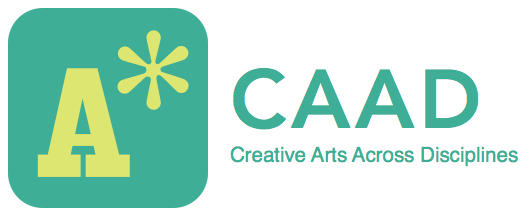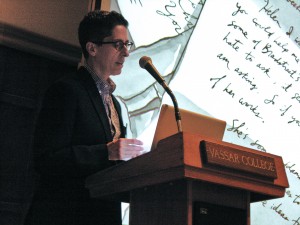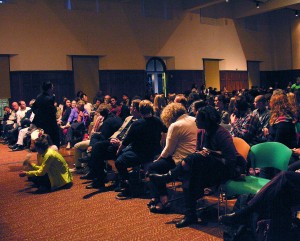The screen turns on and the first images are a series of letters. ‘I deserved it back then,’ now MacArthur Fellow, Alison Bechdel, shares. Letters keep coming and flashing ahead, all with eloquent ways of phrasing a common denominator: rejection. But she now stands in front of an audience at Vassar’s Villard Room, discussing her creative process and providing an insightful analysis of the Freshman Common Reading and New York Times Best Seller Fun Home, A Family Tragicomic.
This book has generated discussion and been deemed controversial in other settings, but has been part of the Vassar curriculum for years now. Most recently, the incoming Class of ‘18 at Vassar College read it over the summer and elaborated literary or graphic responses to her artwork. This graphic memoir portrays the relationship between the author and her father, its progression and decay as secrets surface with time. Both strive to come to terms with their homosexuality, and the more Bechdel is able to establish connections among travels, people, literature and isolated events, the more she is able to make sense of her own identity. It is a rendition of a coming of age, a look to the past, and a glimpse at the future.
The author of Dykes to Watch Out For, a comic strip that ran for 25 years, speaks of the power of words–not in isolation, but in their interaction with images. ‘Pictures and words capture my experience because they are not just the symbolic notion of language, but also the visceral, physical part of being a body in this world,’ she shares. She alludes to past artwork and then proceeds to explain vignettes from Fun Home. As she reads segments of pages and illustrations are being projected, her words resonate with a familiarity that is welcomed by those who have had the pleasure of experiencing her works.
What is perhaps the most fascinating facet of Bechdel is her blatant vulnerability. Fun Home is such a personal account of life that she mentions some of her family wishing she hadn’t written it. She asserts that the publication of this graphic memoir has made many question the death of her father. ‘My brother thinks I was too harsh,’ she says.
In regards to her father, Bechdel affirms he killed himself shortly after she came out to her parents as a lesbian, but even in the book she leaves it as an open question. Bechdel’s coming out and coming of age triggered a number of revelations that unraveled the enigma surrounding several people and events in her life. Such is the case of one of her father’s lovers, who would babysit her and her siblings growing up. Looking through family photographs she found a portrait of him, ‘low contrast but beautiful nonetheless,’ she says, censored, or at least attempted to. He is lying in bed shirtless, the sun blazing across a wide open window, almost like a candid–it’s a memento of youth. The year and place are scribbled over with marker, yet the month, August, remains.
Her relationship to her mother was one of distance, and she elaborates on this throughout Are You My Mother? A Comic Drama. However, when as a child Alison is rendered unable to write due to her self-obliterating O.C.D., her mother functions as a medium to document her life’s events. Bechdel recalls this as the moment she decided to become a memoirist. ‘Fun Home is about reading. Are You My Mother? is about writing,’ she says. Fun Home has been made into a musical play that will soon be in Broadway.
True to her prose, Bechdel’s speech is curiously intimate and shamelessly revealing. She is asked by a student in the audience how she selects what moments to portray, which ones she is comfortable with sharing. Bechdel responds by saying she’s not even sure she is comfortable with the ones now shared. It is because she is determined to work without inhibitions that her works are undeniably stimulating.


